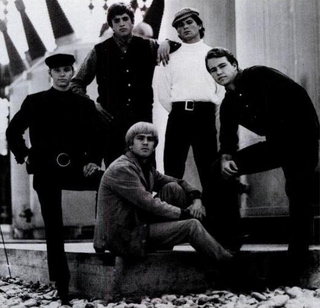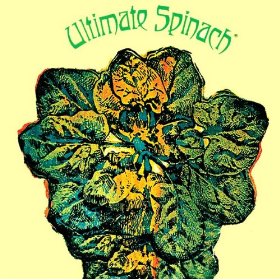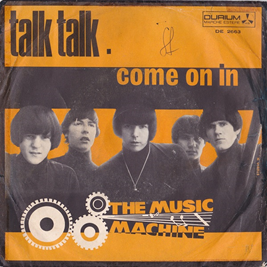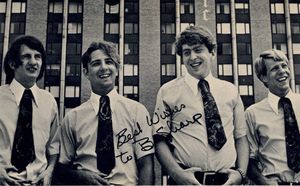Related Research Articles
Psychedelic rock is a rock music genre that is inspired, influenced, or representative of psychedelic culture, which is centered on perception-altering hallucinogenic drugs. The music incorporated new electronic sound effects and recording techniques, extended instrumental solos, and improvisation. Many psychedelic groups differ in style, and the label is often applied spuriously.
Garage rock is a raw and energetic style of rock and roll that flourished in the mid-1960s, most notably in the United States and Canada, and has experienced a series of subsequent revivals. The style is characterized by basic chord structures played on electric guitars and other instruments, sometimes distorted through a fuzzbox, as well as often unsophisticated and occasionally aggressive lyrics and delivery. Its name derives from the perception that groups were often made up of young amateurs who rehearsed in the family garage, although many were professional.

The Electric Prunes are an American psychedelic rock band, formed in Los Angeles, California, in 1965. Much of the band's music was, as music historian Richie Unterberger described it, possessed of "an eerie and sometimes anguished ambiance." Their most successful material was by songwriters Annette Tucker and Nancie Mantz, though the group also penned their own songs. Incorporating psychedelia and elements of embryonic electronic rock, the band's sound was marked by innovative recording techniques with fuzz-toned guitars and oscillating sound effects. In addition, guitarist Ken Williams' and singer James Lowe's concept of "free-form garage music" provided the band with a richer sonic palette and exploratory lyrical structure than many of their contemporaries.
Acid rock is a loosely defined type of rock music that evolved out of the mid-1960s garage punk movement and helped launch the psychedelic subculture. Named after lysergic acid diethylamide (LSD), the style is generally defined by heavy, distorted guitars, lyrics with drug references, and long improvised jams. Much of the style overlaps with 1960s garage punk, proto-metal, and early heavy, blues-based hard rock.

The Monks, referred to by the name monks on record sleeves, were an American garage rock band formed in Gelnhausen, West Germany in 1964. Assembled by five American GIs stationed in the country, the group grew tired of the traditional format of rock, which motivated them to forge a highly experimental style characterized by an emphasis on hypnotic rhythms that minimized the role of melody, augmented by the use of sound manipulation techniques. The band's unconventional blend of shrill vocals, confrontational lyrics, feedback, and guitarist David Day's six-string banjo baffled audiences, but music historians have since identified the Monks as a pioneering force in avant-garde music. The band's lyrics often voiced objection to the Vietnam War and the dehumanized state of society, while prefiguring the harsh and blunt commentary of the punk rock movement of the 1970s and 1980s. The band's appearance was considered as shocking as its music, as they attempted to mimic the look of Catholic monks by wearing black habits with cinctures symbolically tied around their necks, and hair worn in partially shaved tonsures.

The Music Machine was an American rock band formed in Los Angeles, California in 1966. Fronted by chief songwriter and lead vocalist Sean Bonniwell, the band cultivated a characteristically dark and rebellious image reflected in an untamed musical approach. Sometimes it made use of distorted guitar lines and hallucinogenic organ parts, punctuated by Bonniwell's distinctively throaty vocals. Although they managed to attain national chart success only briefly with two singles, the Music Machine is today considered by many critics to be one of the groundbreaking acts of the 1960s. Their style is now recognized as a pioneering force in proto-punk; yet within a relatively short period of time, they began to employ more complex lyrical and instrumental arrangements that went beyond the typical garage band format.
The Lollipop Shoppe was an American garage rock band formed in Las Vegas, Nevada, in 1966.

The Rising Storm is an American rock group that was active at Phillips Academy in Andover, Massachusetts, United States, between 1965 and 1967. Their music is considered to belong in the folk rock and garage rock genres. The original members of the group were Bob Cohan (guitar), Todd Cohen (bass), Charlie Rockwell (keyboards), Tom Scheft (drums), Tony Thompson, and Rich Weinberg.

"Who Do You Love?" is a song written by American rock and roll pioneer Bo Diddley. Recorded in 1956, it is one of his most popular and enduring works. The song represents one of Bo Diddley's strongest lyrical efforts and uses a combination of hoodoo-type imagery and boasting. It is an upbeat rocker, but the original did not use the signature Bo Diddley beat rhythm.

Ultimate Spinach is the 1968 self-titled debut album by the American psychedelic rock band Ultimate Spinach, and was released on the MGM Records label (E/SE-4518) simultaneously with the debut LP of two other Boston-area bands, Beacon Street Union and Orpheus. Both albums were heavily promoted by the label as being representative of the "Bosstown Sound". The commercial ploy was heavily driven in psychedelic music that attempted to replicate the San Francisco Sound.

Johnny Burnette and the Rock 'n Roll Trio is the 1956 debut album of the rockabilly band The Rock and Roll Trio, fronted by Johnny Burnette. Recorded over three separate sessions in 1956, the album includes a number of the band's singles. 2008's Icons of Rock calls the album "an all-time rockabilly classic". Released as a 10" LP in the UK by Vogue/Coral Records in December 1956 (#10041), it was released again in 12" format in its US debut by Coral Records in 1957 (#57080) and in 1978 by Solid Smoke (#8001). A few years previously, there had also been an unauthorized reissue of the album which featured an exact reproduction of the cover and label, although differences in label and cover formatting noted by collectors reveal it as a reprint. In 1993, it was released on compact disc by Aris Records. 1998's Go Cat Go!: Rockabilly Music and Its Makers characterizes the CD reissue as "legendary and essential."

The Free Spirits was an American band credited as the first jazz-rock group. The band also incorporated elements of pop and garage rock. Their first album Out of Sight and Sound was recorded in 1966 and released in 1967.
Kenny and the Kasuals were an American garage rock band formed in Dallas, Texas in 1964. The band played at various venues, including the Studio Club, with a repertoire that consisted of material taken from the British Invasion and R&B standards. Over time the band began experimenting with early elements of psychedelic music and are often cited as one of the first groups to play in such a style. Kenny and the Kasuals released several singles including their best-known song, "Journey to Tyme". A live album, Impact, was also recorded in 1966.

"Talk Talk" is the debut single of American garage rock band The Music Machine. It was released in November 1966, and produced the band's only Top 20 hit on the Billboard Hot 100. The song was included on their debut album, (Turn On) The Music Machine.
"The White Ship" is a song released by the American psychedelic rock band, H. P. Lovecraft, in November 1967. The songwriting is credited to band members George Edwards, Dave Michaels, and Tony Cavallari. Acting as the opening song on the second side of their debut LP, H. P. Lovecraft, it was the album's longest track, and an edited version was also released as the band's second single. The name and theme of the song derive directly from author H. P. Lovecraft's short story, "The White Ship". Despite its failure to chart nationally, it is widely considered to be H. P. Lovecraft's most accomplished piece, and helped establish the group, who were originally from Chicago, in the West Coast music scene.
"The People in Me" is a song by the American garage rock band, The Music Machine, written by Sean Bonniwell, and was first released as a track on their debut album (Turn On) The Music Machine in December 1966 on Original Sound Records. The song was also released as the A-side to the group's second single, which was distributed on January 21, 1967. Like many of Bonniwell's compositions, "The People in Me"'s lyrical content featured a gloomy rebellious mood, with eerie lead vocals by Bonniwell, and it explored with a hard-edged variation of psychedelic rock. It also featured guitarist Mark Landon's wiry distorted guitar melodies, joined by backing vocals near the conclusion of the song.

The Bonniwell Music Machine is the second and final album by the American garage rock band, The Music Machine, recorded under the renamed moniker, The Bonniwell Music Machine, and released on Warner Bros. Records, on February 10, 1968. As with their debut LP, the album again saw the band blending garage and psychedelic rock influences, albeit with a greater emphasis on psychedelia than on their previous album release. Prior to completing its recording, all of the group's original members, except for its creative force, Sean Bonniwell, departed, though they would still appear on some of the album's tracks.

Bohemian Vendetta was an American garage rock and psychedelic band from Long Island, New York, who were active from 1966-1968. In addition to recording two officially released singles and several previously unissued demos, they cut a self-titled album, Bohemian Vendetta, released by Mainstream Records in 1968.

"It's Cold Outside" is a song by the American garage rock band the Choir, written by the Choir's drummer, Dan Klawon, and first released on Canadian-American Records in September 1966. It is considered a classic of the musical genre of garage rock, and became the group's only national hit. The song has since been featured on several compilation albums.

T.C. Atlantic was an American garage rock/psychedelic rock band from Minneapolis, Minnesota who were active in the 1960s. They were one of the most popular groups in the Twin Cities, but failed to break nationally. In the intervening years since their breakup, their recordings have attracted the interest of '60s music collectors and enthusiasts, and they are particularly remembered for their 1966 fuzz-tinged song, "Faces", which has been mentioned as one of the earliest garage rock songs to display psychedelic characteristics.
References
- Unterberger, Richie (1998). Unknown Legends of Rock 'n' Roll: Psychedelic Unknowns, Mad Geniuses, Punk Pioneers, Lo-fi Mavericks & More . Backbeat Books. ISBN 0-87930-534-7.